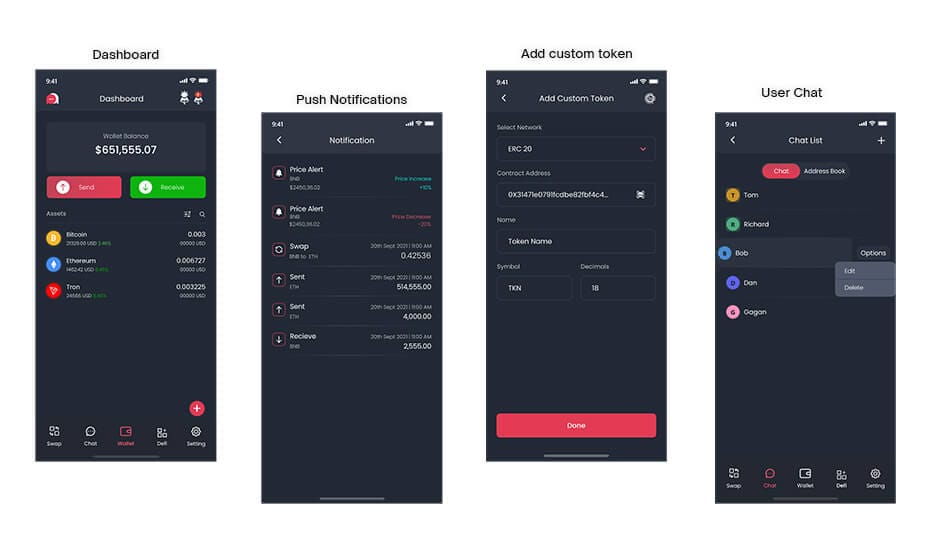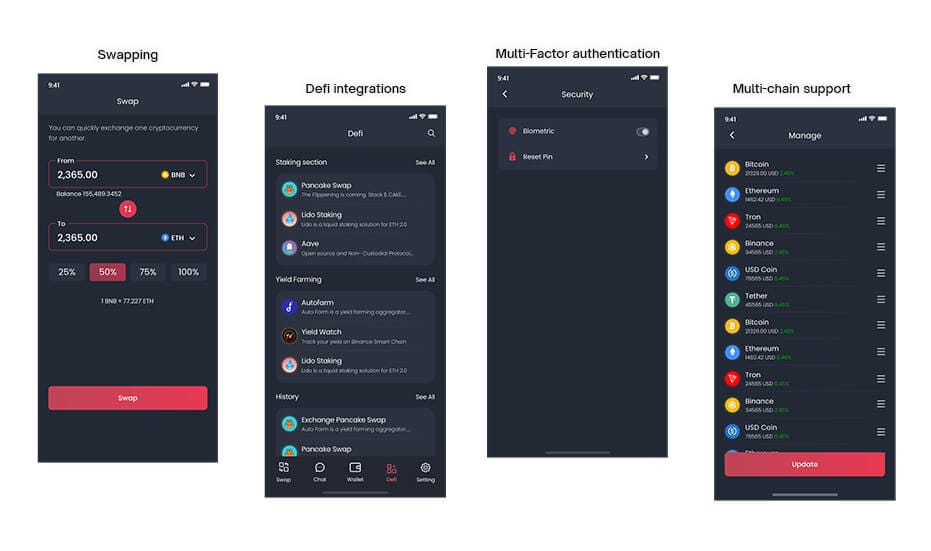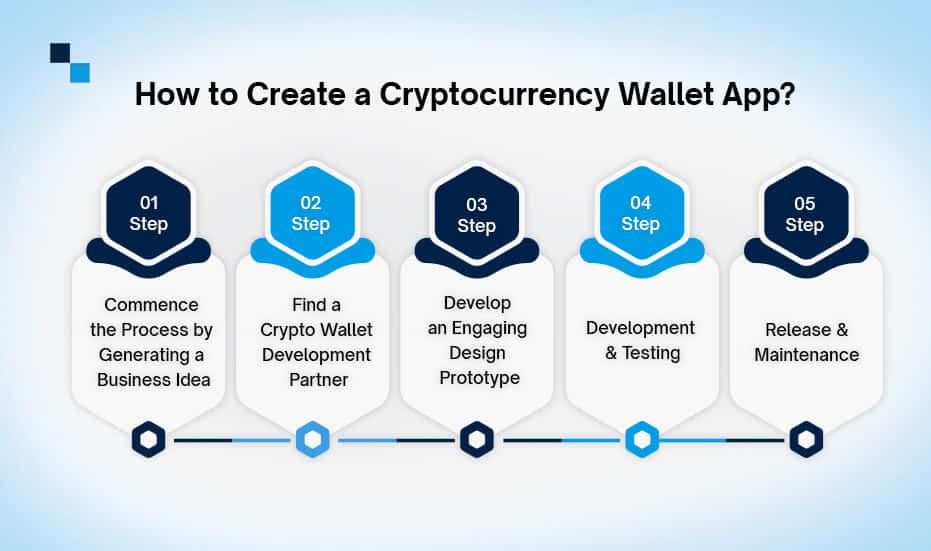
All You Need To Know Before Developing Your P2P Exchange in 2023
May 23, 2023
Develop A Crypto Peer to Peer Lending Software To Empower Businesses
May 24, 2023You or your friends have started trading or investing in crypto. What’s the benefit? Cryptocurrency is the only asset that grows by 50% in a few days and provides profitable returns. Even the banking product doesn’t give 15%+ APY as a passive income. Furthermore, No Fiat currency helps you carry out transactions anonymously. All this is possible with the crypto wallet app. If you are planning to venture into crypto wallet app development and need good recommendations without learning the code, here is the best guide for non-technical enterprises and investors.
Key Takeaways:
1. Before starting crypto wallet app development, Choosing between custodial and non-custodial wallets is important. Third parties generally manage a custodial wallet option, while a non-custodial wallet gives complete asset authority to the users.
2. Developing a wallet application requires a lot of effort. In such cases, you can build an exchange offering enhanced security or consult a provider who can develop a solution in the minimum time.
3. Launching a crypto wallet that supports a few coins is easier as it doesn’t need to be integrated with other blockchains.
Crypto Wallet App Market Overview

Blockchain technology has fulfilled the expectations of startups and Fortune 500 companies, making crypto wallet app development the most thriving segment of this era. The graph illustrates the increase in the market size of crypto wallets has been observed from 2018 to 2030. This means that wallets have become a preferred choice of several nations, and their massive adoption will increase by 2030.Whether you are a start-up or a Fortune 500 firm, you can invest in the segment with the guidance of crypto wallet app development professionals and boost your income with it.

Reasons to Create a Blockchain Wallet App
It is impossible to perform crypto activities without a crypto wallet. In other words, It is software that stores virtual currency. These virtual currencies are stored on the blockchain, a peer-to-peer network of computers. One can start sending or receiving crypto via a wallet address. Basically, a crypto wallet app is a user-interface portal for blockchain.
The main reason behind crypto adoption is good financial returns. The platform allows individuals to earn money using decentralized finance products, thereby resulting in a surge in digital coins by thousands. A crypto wallet app connects customers with decentralized finance products. Even banks and financial institutions have started informing individuals about crypto trading and investment options leading to a rise in demand for these apps. If you are a startup or Fortune 500 firm, you can venture into this segment with a crypto wallet app development company to boost your earning potential.
Related: https://www.antiersolutions.com/how-to-develop-crypto-wallet-app-on-blockchain/
Categories & Examples of Crypto Wallet
Before developing a crypto wallet application, it is vital to understand the categories of crypto wallets.
- By Governance
Decide whether you want to create a centralized or a non-centralized wallet solution. They are known as custodial and non-custodial wallets. In the case of custodial crypto wallet, a private key must be generated for its operation on the server. Private keys are basically 12-word mnemonic phrase used to access and backup the contents of the wallet. The private keys, in the case of custodial wallets, are managed by third parties. Businesses that don’t feel safe handing over the keys to third parties prefer developing non-custodial wallets. The responsibility of managing the wallet keys is entirely in the hands of the users. Sharing the keys means losing access to the contents of the wallet.
Custodial Vs. Non-Custodial Wallet
- Cypto key is completely in the hands of users
- Less or zero KYC onboarding
- Losing phrase means losing funds
- Users pay the network fees
Custodial Crypto Wallet
- Third parties hold the user’s coins
- KYC while onboarding or off ramping
- Lost password can be retrieved
- Might cover a percentage fees
Related: https://www.antiersolutions.com/what-makes-custodial-wallet-a-sound-investment-choice/
2. By Platform
Crypto wallets can be installed on various platforms:
- Mobile
- Desktop
- Web
- Hardware
Certain users keep switching gadgets while using the platform. Therefore, creating a crypto wallet that can run on different platforms is vital. For instance, a Metamask wallet is a browser extension and a mobile application. Additionally, it can be integrated with hardware solutions like Trezor and Ledger. On the other hand, Lumi Wallet operates like a web application similar to Gmail.
3. By Coin Availability
A crypto wallet app doesn’t support every coin. This is so as these exist on different blockchain platforms. For instance, Bitcoin operates on Bitcoin networks, while coins like Litecoin or Dogecoin operate on the Ethereum blockchain. Therefore, if you want to develop a solution that supports several coins develop a multi-currency crypto wallet app.
Popular Blockchain Wallet Development Applications
- Trust Wallet
- MetaMask
- Crypto.com
- BRD
- Coinbase
- Exodus

Common Misconceptions Related to Crypto Wallet Apps
Several misconceptions revolve around crypto wallets, so let us have a look at them:
1. Fact: App Switching is a Simple Process
Reality: You can download another application along with a non-custodial wallet,enter the seed phrase to access virtual currencies which is a complicated process. On the contrary, users are responsible for holding private keys securely and can access the wallet by entering them.
2. Fact: Web Wallets are the Least Secure Alternatives
Reality: Cyber security threats and vulnerabilities can take place with any crypto wallet app.The same is true with web wallets. Hence, it is the responsibility of the crypto wallet app development company to educate the customers on safe practices and the way advanced tools must be used to protect the funds. Even users can develop crypto wallets like Metamask, which has been integrated as a web browser extension and has created very few cyber threat cases.
3. Fact: Hidden Crypto Transactions
Reality: The crypto transactions aren’t hidden as if someone has your wallet address, that individual can view all account-related transactions as the blockchain holds the data. However, This doesn’t mean that the security is at stake. It is basic transparency, one of the significant traits of blockchain technology.
4. Fact: Users can Generate a New Crypto Wallet Phrase
Reality: Getting the wallet contents back is impossible once the private key is compromised. Losing cryptos is just like losing money from physical wallets. One can only retrieve their funds in the case of custodial wallets.
Signature Features of Crypto Wallet

If you are planning to create a crypto wallet, make sure that it includes the following critical features:
- Dashboard
- Profile linked with a bank account or credit/debit cards
- Favorite addresses
- QR code Scanner
- Import wallet
- Transaction history
- Add custom token
- Push Notifications
- API Connections to Crypto Exchanges
- User-Chat
Advanced Features of Crypto Wallet App

If you wish to make your crypto wallet app more attractive, integrate the advanced features listed below:
- Staking
- Swapping
- Trading
- Fee adjustments during transactions
- Multiple chain support
- Price information updates
- Dark mode / quick web login / direct integrations with DeFi products
If you are new to crypto wallet development, there is a possibility that you might feel lost and exceed your budget. Ensure that the features you need are included in the wallet while launching a product initially.
Security Considerations Taken into Consideration
- Ensure that the user has written the 12-word mnemonic phrase & make them enter them correctly to access the non-custodial wallet.
- In the case of custodial wallets, KYC is integrated with image recognition and AI for face & text recognition.
- A decentralized wallet provides a referral code, thereby providing a bonus to the users.
- Crypto wallet generates PIN code or face ID.
These steps will make the onboarding process smooth for the users.
Challenges Faced while Developing a Crypto Wallet App
What challenges will you experience during crypto wallet app development? An enterprise will face technical and business challenges while developing an application discussed as follows:
- Blockchain forks don’t occur regularly, but when they do, it is vital to determine the blockchain version supported by the wallets.
- The need to include more blockchains to support more coins.
- Despite the huge demand adopting the technology is still a challenge as customers come across fraud companies while developing the application for the first time. It is vital to research thoroughly and associate with crypto wallet development experts with a proven track record in wallet development.
- Crypto products that fail get a second chance in very few cases under the same brand.
- Finding a Blockchain wallet development team with hands-on experience developing user-friendly designs and blockchain technology.
Technology Stack Used for Developing Crypto Wallet
Different blockchain developers use different technologies as per their experience. Thus, One can develop crypto wallet apps based on different technologies. Also, you require basic knowledge about blockchain projects to develop them. Here is a complete list of technical stacks:
- Mobile Apps
Mobile apps are developed using React Native for iOS &Android devices. These languages are supported by Google and Apple by providing more advanced toolsets for developing applications for Android and iOS devices.
- Web
React and Node.js consists of the latest development tools with numerous instruments present in the market.
How to Create a Cryptocurrency Wallet App?

The process of developing a crypto wallet app has been divided into steps. Let us go through each one of them:
- Step 1: Commence the Process by Generating a Business Idea
The process of crypto wallet app development starts with a business idea. The industry is still in its budding stage, and many ideas come from our experiences as we come across various issues. These challenges will tempt you to find a solution resulting in intensive research. Many individuals have already proposed a solution for the issue that you are experiencing. If this is the situation, study the product, find ways to enhance it, and make it appealing to the target audience.
- Step 2: Find a Crypto Wallet Development Partner
Once you have shared your idea, it’s time to turn it into reality. Hire a reliable crypto wallet app developer to pick holes out of your business idea and provide a feasible solution. They are from a development background and take care of every single aspect, from discovery to maintenance.
Specialists You Need for Crypto Wallet Development
- Product managers
- Project Managers
- UI/UX Designers
- Developers
- Testers
- DevOps Engineers
- Step 3: Develop an Engaging Design Prototype
Once you have selected the wallet provider, it’s time to design a prototype. Make sure that the screens are well-designed and linked with each other. The prototype is shared with the client to give an idea of the look and feel of the project. Changes are made based on the client feedback, and the project heads to the development phase.
- Step 4: Development & Testing
Once the prototype has been developed, it is time to make it live using development. The wallet is developed using advanced technologies. Furthermore, the application is tested and undergoes third-party audits the application to prevent errors and glitches.
- Step 5: Release & Maintenance
Finally, the application is released on Playstore or App Store. During this phase, user feedback is obtained, and alterations are performed for the smooth working of the wallet.
Cost of Developing a Crypto Wallet App
The cost of developing a crypto wallet application depends on numerous factors like features & functionality, technical stack, crypto wallet team, and app size. Let us discuss them in detail:
1. Size of the Wallet App
The size of the application affects the overall cost of the wallet. The application size increases with the increase in the feature list, increasing the wallet cost.
2. Crypto Wallet Design
Simple and appealing aesthetics leave an everlasting impression on the users. Determining the specifications and giving the cryptocurrency wallet development team time to work on intricacies like UI/UX design, wireframes, etc, is vital.
3. Size of Team
The price of crypto wallet development also depends on team size. Hiring a full-fledged team would be the suitable course of action as they will divide different parts of the project and develop a powerful solution in the least turnaround time.
4. Technical Stack
The technical stack incorporated while developing a crypto wallet app impacts the project cost.
5. Features
The addition of features increases the price of the wallet. Software with a limited feature set will cost less, while software with a huge feature list, like in-chat payments, KYC checks, OTC trading, etc., will cost more.
Final Words
Partner with top cryptocurrency app development companies like Antier that develops secure solutions and develops them as per your business needs. The experts keep the entire process transparent to prevent issues at later project stages. Our experts have delivered innovative and unique solutions since 2016 and deployed over 250 projects.
Discuss your requirements and turn them into reality with the support of our dextrous developers today!



